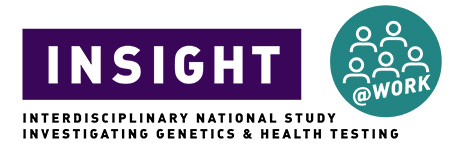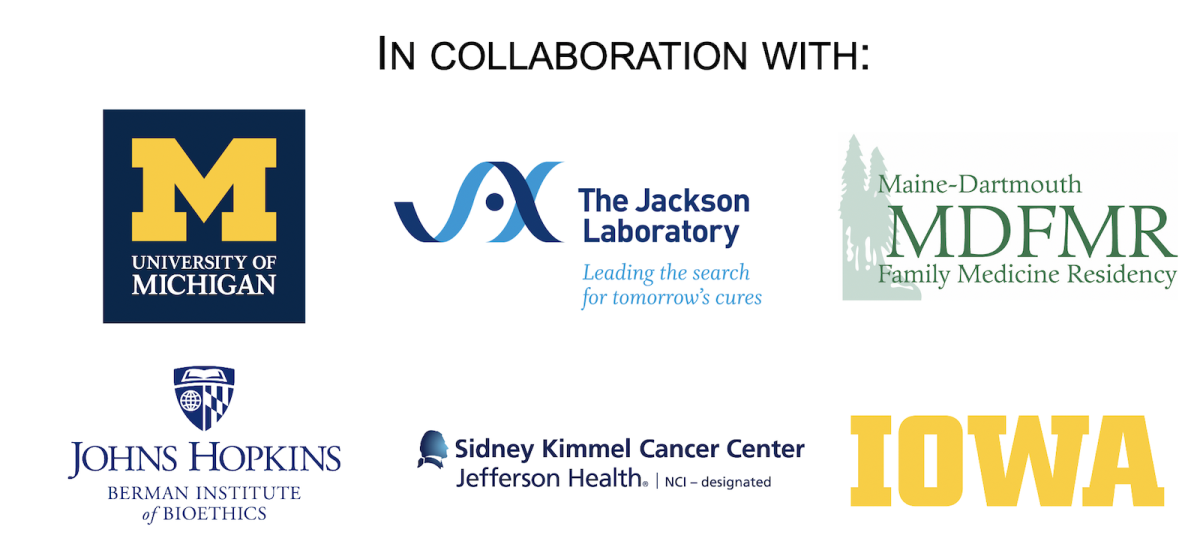 Direct-to-consumer (DTC) genetic and genomic testing services have sky-rocketed in popularity and employers are taking note. We are beginning to see employers offering genetic or genomic testing services within their health packages; yet, the research behind voluntary workplace genomic testing (wGT) is minimal. Our team is here to change that. We are utilizing a comprehensive multi-step approach of quantitative and qualitative analysis (including surveys and interviews) to gather employee and employer perspectives, as well as workshops with stakeholders to illuminate what our findings mean for policy changes and the future of wGT.
Direct-to-consumer (DTC) genetic and genomic testing services have sky-rocketed in popularity and employers are taking note. We are beginning to see employers offering genetic or genomic testing services within their health packages; yet, the research behind voluntary workplace genomic testing (wGT) is minimal. Our team is here to change that. We are utilizing a comprehensive multi-step approach of quantitative and qualitative analysis (including surveys and interviews) to gather employee and employer perspectives, as well as workshops with stakeholders to illuminate what our findings mean for policy changes and the future of wGT.

Employer health plans cover over 157 million people in the United States. These plans may also include added wellness benefits with incentives for employees to reach goals, such as improvement in blood test values, making healthy lifestyle changes, and even genetic or genomic testing. Despite the positive changes these wellness benefits try to encourage, publications have pointed out concerns for coercion, discrimination, and law and policy violations – concerns that feel even more real when considering genetic information. Surveys of the public have shown that there are feelings of wariness and concern for genetic privacy when considering genetic testing.
Genetic testing can inform many facets of a person’s health including understanding of disease risks, familial implications, and changes to medical care. With this understanding, genetic testing companies began offering genotyping services that did not need to be ordered by a physician and could be done with ease from home. These tests are now known as direct-to-consumer (DTC) tests. DTC genetic and genomic tests have increased in popularity and are predicted to become a multi-billion-dollar industry by 2025.
As DTC genetic and genomic services continue to gain popularity, employers have begun to take notice. Some employers are beginning to include genetic testing within their employee benefits options, yet there is minimal understanding of the ethical, legal, social, and policy implications that offering this testing may bring, including privacy concerns and discrimination. In addition, there is minimal understanding of the motivations on both the sides of the employer and the employee. Therefore, to better elucidate the impacts of offering wGT we are taking a comprehensive, three-pronged approach. This will include identifying employers’ and employees’ perspectives, and a final set of workshops to identify the key ethical, legal, social, & policy implications.

Employers’ perspectives
It is vital we know what employers are considering when choosing whether to offer wGT. Analysis of employers’ and their perspectives is broken up into two steps:
- First, we want to know the “who?”
- Who is offering this testing? Are these large companies or smaller companies? Is it many companies or only a few? We will perform a landscape analysis that works to answer these questions for us.
- Second, we want to speak to these companies directly about their decision-making process.
- Using semi-structured interviews, we will talk to key stakeholders within the company that either decided to offer wGT or have declined to offer wGT.
Employees' Perspective
Employees' understanding and outlook can give us insight into why employees would or could not pursue wGT. Additionally, by talking with employees that have used this benefit we can identify perceived benefits or harms of wGT. We have split this into three steps:
- In order to gather a representative, national sample, 2,000 employed United States adults will be surveyed about their attitudes and beliefs regarding wGT.
- In partnership with a large healthcare system, whom offers wGT, we will survey both employees that decided to pursue and to decline wGT regarding their perceived harms and benefits of wGT.
- Finally, we will follow up with those employees that decided to pursue wGT to further understand what psychological, behavioral, and economic impact wGT may have had.
Normative assessment
Normative assessment is an exciting time to involve stakeholders from across the spectrum (insurance companies, genomic testing companies, employees, employers, policy-makers, regulators, health professional societies, and business organizations) in the discussion of the impact of wGT. We will utilize both a deliberative workshop format, as well as a modified Delphi process. The deliberative workshop approach will create a facilitated environment for in-depth discussion regarding wGT. In addition, we will utilize a modified Delphi method to reach consensus regarding the ethical, legal, and social implications, as well as future policy recommendations.